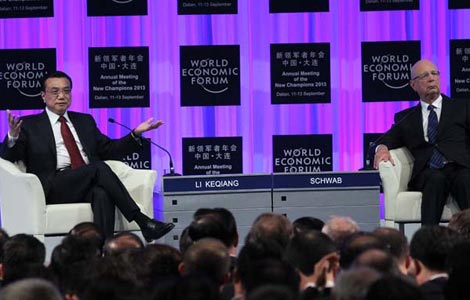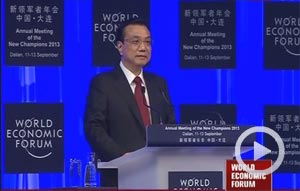Nobel laureates pinpoint new engines for Chinese growth
Updated: 2013-09-12 21:52
(Xinhua)
|
||||||||
BEIJING -- Nobel Prize winners have pinpointed new growth engines for China, after its economy showed strong signs of strengthening during the past few months.
Robert Mundell, a 1999 Nobel Prize-winning economist, said Thursday on the sidelines of the Nobel Laureates Beijing Forum that China's policies are very important for the world due to its significant role in sustaining growth in the global economy.
As the biggest trader and the second largest economy in the world, China accounts for more than 10 percent of the global economy and plays a major role in sustaining global economic growth, Mundell said.
However, sluggish overseas demand and the government's reluctance to ease policies have trapped the country in a protracted slowdown, as its growth dipped to 7.5 percent in the second quarter of this year from 7.7 percent in the first three months and 7.9 percent in the final quarter of 2012.
Instead of initiating a massive stimulus plan, authorities are moving cautiously by speeding up shantytown renovation, accelerating railway and infrastructure investment, and reducing taxes for small businesses to spur growth while pushing forward reforms.
Recently, there have been strong signs that the economy has stepped out of the lengthy downturn, as shown by many economic barometers, including the purchasing managers' index, exports and industrial production.
The signs of a stronger economy are mainly brought about by policy changes of the Chinese government, Mundell said.
The country's PMI for the manufacturing sector rose to 51 percent in August, the highest level this year, data from China Federation of Logistics and Purchasing showed.
China's industrial production gained traction in August with its value-added output expanding at its fastest pace in 17 months, while its exports rose 7.2 percent year-on-year last month, 2.1 percentage points faster than that of July.
Mundell said the country should not rely too much on exports for driving its growth, but rather turn to consumption and investment.
He said "consumption in China is underrepresented" as it contributes to only around 40 percent of GDP growth, compared to 70 to 80 percent in developed countries.
Data from the National Bureau of Statistics showed the contribution of final consumption in GDP stood at 45.2 percent in the first half of the year, driving up GDP growth of 3.4 percent.
Mundell added that China should also increase the role of services in the economy as it is a major source of employment.
This emphasis coincides with Premier Li Keqiang's words at a Tuesday meeting with entrepreneurs at the Annual Meeting of the New Champions 2013, also known as Summer Davos.
Li said that China should continue with economic restructuring, especially vigorously promote the service industry as it is "the largest container for employment."
Last year, the service sector represented 44.6 percent of China's GDP, lagging far behind a proportion of more than 70 percent in developed countries.
"Increasing consumption and increasing services in the economy are changes that have to be made by the government," Mundell said.

 Another iPhone4 explodes while charging
Another iPhone4 explodes while charging
 Premier stresses transformation of the economy
Premier stresses transformation of the economy
 Soyuz capsule returns from space station
Soyuz capsule returns from space station
 China's Christian churches reduce leaders' age ceiling
China's Christian churches reduce leaders' age ceiling
 Student's rare blood bonds Kazakhstan and China
Student's rare blood bonds Kazakhstan and China
 Apple's low-end phone price disappointing
Apple's low-end phone price disappointing
 US marks 9/11 anniversary
US marks 9/11 anniversary
 German Bach elected as IOC president
German Bach elected as IOC president
Most Viewed
Editor's Picks

|

|

|

|

|

|
Today's Top News
Can China withstand global funds shifts?
China Daily Asia Weekly wins media award
Report questions US firms pursuing cloud computing in China
Reducing poverty gains momentum in Asia
China turns to US sorghum for animal feed
China's global firms face 'trust gap'
Li stresses transformation of economy
US delivers weapons to Syrian rebels
US Weekly

|

|






